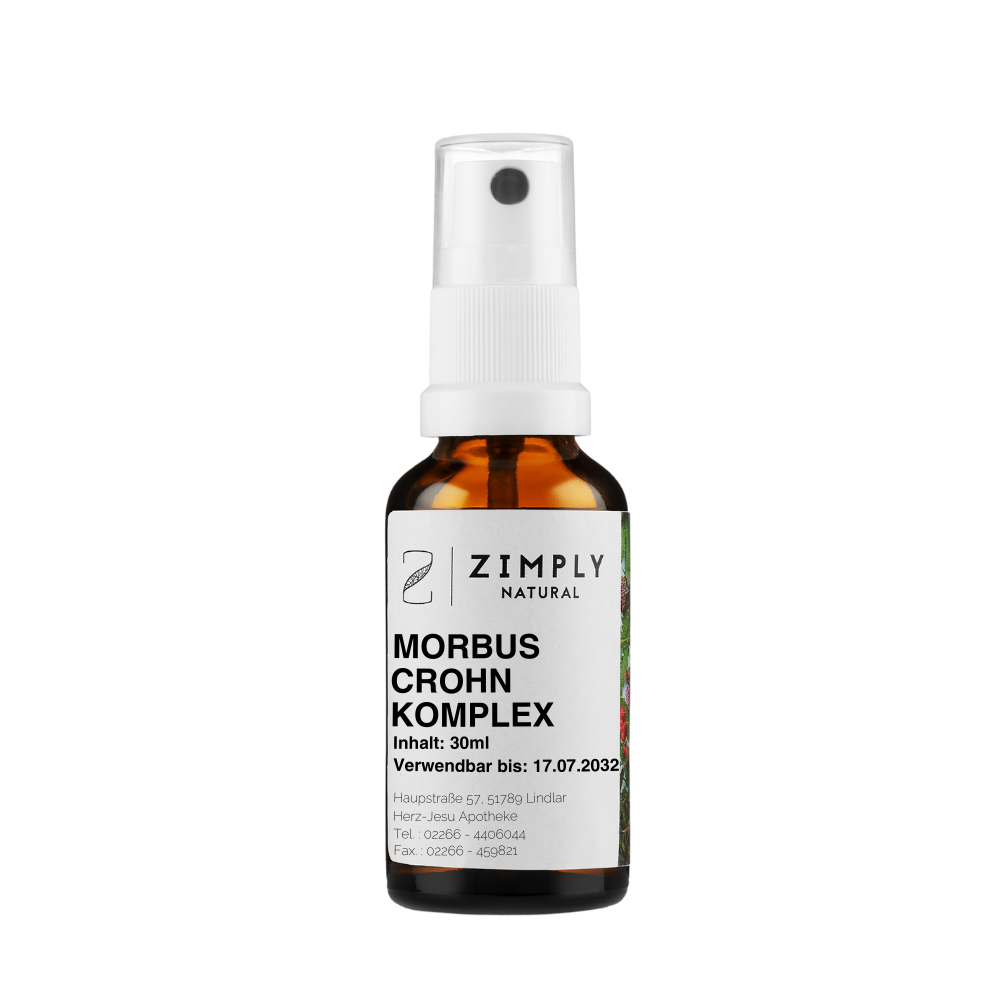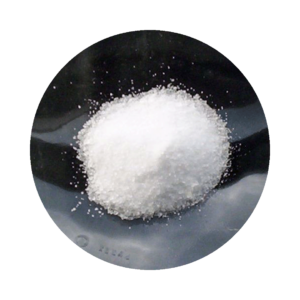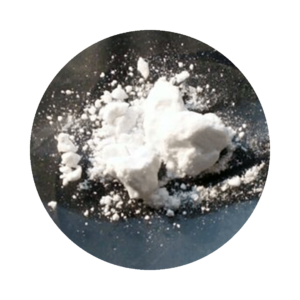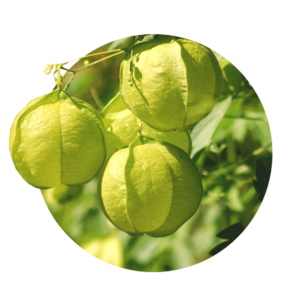Crohn's disease is an inflammatory and chronic disease of unknown origin. In Germany, more than 320,000 people suffer from inflammatory bowel diseases such as ulcerative colitis or Crohn's disease. In this blog post, we want to introduce you to some natural tips and home remedies that can help you to relieve your symptoms. If this sounds interesting to you, we hope you enjoy reading it!
With natural methods, such as the individual spagyric mixtures from Zimply Natural, your complaints can be relieved naturally and sustainably.
Table of contents
- What is Crohn's disease?
- What causes can Crohn's disease have?
- These symptoms can occur with Crohn's disease
- These lifestyle changes could have a positive effect on Crohn's disease
- These diseases can have similar effects to Crohn's disease
- How the diagnosis of Crohn's disease works
- Home remedies and natural tips that can help you with Crohn's disease
- These medicinal plants can support you with your Crohn's disease symptoms
- Zimply Natural - Your natural help for Crohn's disease
- FAQ: Questions and answers about Crohn's disease
What is Crohn's disease?
Crohn's disease is a chronic inflammatory bowel disease that mainly affects the digestive tract, but can also affect other areas of the body. The intestinal disease causes inflammation of the intestinal wall, which can lead to symptoms such as abdominal pain, fatigue, diarrhea and weight loss. The severity of the effects varies from person to person. In addition, Crohn's disease usually progresses in episodes, i.e. symptom-free phases alternate with phases of pronounced symptoms. The exact cause of Crohn's disease is not fully known, but a combination of factors is thought to be significant. For example, the immune system can mistakenly attack the intestines, which can lead to chronic inflammation. Unfortunately, there is no cure for Crohn's disease. However, various treatment methods can help to control the symptoms and reduce flare-ups.
That the peak of the initial diagnosis is often between the ages of 15 and 30? However, there are also some cases in which Crohn's disease occurs in childhood or in older adults.
What causes can Crohn's disease have?
The causes of Crohn's disease are not yet fully understood. However, there are some factors that can be assumed to increase the risk of Crohn's disease. One of these is genetics, as Crohn's disease occurs more frequently in some families. It is assumed that first-degree kinship to a person with the disease is a risk factor. The Immunesystem also plays an important role in the development of Crohn's disease. This is because the immune system may mistakenly attack and inflame healthy intestinal tissue. This happens due to an incorrect immune response in the intestinal tract. The intestine itself can also influence the development of Crohn's disease, as an imbalance in the Intestinal flora can irritate the immune system. This can trigger an overreaction of the immune system, which can increase the inflammation. Some lifestyle habits such as Smokingunhealthy diet and stress can increase inflammation in the intestinal tract and contribute to the development of Crohn's disease.
These symptoms can occur with Crohn's disease
The symptoms of Crohn's disease can vary from person to person, but there are some effects that occur very often. One of the most common symptoms is abdominal pain or cramps, which usually occur in the lower right abdomen. As a rule, the pain occurs particularly after eating. Diarrhea is also a typical symptom of Crohn's disease. It can be watery or bloody and lead to a strong urge to go to the toilet. Constipation is also possible, especially if the bowel is constricted due to the inflammation. Other symptoms may include weight loss, loss of appetite, fatigue and fever. Crohn's disease can also cause effects that affect other parts of the body. These include, for example, joint pain, inflammation of the eyes, skin rashes or liver problems.

The application of your Crohn's disease sprays is, by the way, very simple: The spray is simply sprayed into the mouth according to the dosage instructions given on the vial. In order to achieve the best possible effect and to be able to optimally counteract the causes, we recommend use over a longer period of six to eight weeks. As a kind of cure, you spray 3×3 sprays daily.
These lifestyle changes could have a positive effect on Crohn's disease
Foods that can make your Crohn's disease symptoms worse
One of the most important and sensible lifestyle changes is to adjust your diet. There are some foods that can make your symptoms worse while others can help your digestion. You should try to avoid dairy products such as milk, cheese and yogurt as these can exacerbate abdominal pain, bloating and diarrhea. These symptoms can also be exacerbated by fatty foods. These include fried foods, fatty meats and high-fat sauces. If you have Crohn's disease, fiber-rich foods such as whole grains, legumes and nuts can worsen your symptoms. The gastrointestinal tract can also be irritated by the consumption of alcohol or caffeine. It is therefore recommended to avoid such foods if you have Crohn's disease.
These foods can stimulate your digestion
Foods that generally do not harm your stomach and can stimulate digestion include cooked vegetables. Cooked carrots, zucchinis, pumpkin or even sweet potatoes are easy to digest and contain important nutrients such as minerals and vitamins. If you have Crohn's disease, you should not eat fruit in large quantities as it contains fructose. However, regular consumption of berries and bananas can be beneficial as they contain a lot of soluble fiber. In addition, the natural sugar in bananas provides an easily digestible source of energy for your body. Another gentle food is white rice, as this is an easily digestible source of carbohydrates that won't put a strain on your stomach. Cooked lean meat and boiled eggs are easily digestible foods that are both rich in protein. Eggs also contain important nutrients such as vitamin D and vitamin B12.
Other lifestyle changes that can help you with Crohn's disease
As with almost all diseases, stress is also a negative factor in Crohn's disease. Good stress management is therefore an important change that you should make. Techniques such as meditation, yoga or breathing exercises can help you here. Regular exercise can also be very effective in promoting digestion. Try to find activities that you enjoy and incorporate them into your daily routine. Even short activities such as walking or cycling can have a positive effect!

These diseases can have similar effects to Crohn's disease
There are some diseases whose symptoms can be very similar to those of Crohn's disease. These include the Irritable Bowel Syndrome (IBS) which is a functional gastrointestinal disorder. Symptoms include abdominal pain, diarrhea, bloating and constipation. Another inflammatory bowel disease is ulcerative colitis (IBD). In addition to the symptoms of irritable bowel syndrome, weight loss is also an effect. The main difference to Crohn's disease is that ulcerative colitis mainly affects the large intestine. Crohn's disease, on the other hand, can affect the entire digestive tract. A disease that can have similar symptoms to Crohn's disease is coeliac disease. However, the causes and mechanisms of the two diseases differ significantly. Coeliac disease is an autoimmune disease in which the consumption of gluten leads to inflammation of the small intestine. In addition to the diseases mentioned, some bacterial, viral or parasitic infections can also have a similar effect to Crohn's disease. Those affected may also be more susceptible to bowel cancer or bowel obstruction.
That Crohn's disease was first described in 1932 by the American gastroenterologist Burrill Bernard Crohn and his colleagues Leon Ginzburg and Gordon D. Oppenheimer? The disease was named after Crohn because he played a leading role in identifying the intestinal inflammation.
How the diagnosis of Crohn's disease works
First of all, your doctor will ask you about your symptoms and medical history in order to document the course of your illness. You will also be asked about your eating and drinking habits in order to identify possible triggers for the illness. In addition, you will probably be asked questions about symptoms such as abdominal pain, diarrhea and weight loss. This will be followed by a physical examination, during which your stomach area will be examined for tender spots in the abdomen or signs of inflammation. Blood tests can be useful for diagnosis, as they can detect signs of inflammation or blood abnormalities. To definitively diagnose Crohn's disease, an endoscopy is often performed. In this procedure, a flexible tube with a camera at the end is inserted into the stomach through the mouth. This allows your stomach lining to be examined for signs of inflammation, bleeding and ulcers. Other diagnostic tests include colonoscopies and imaging tests such as CT or MRI scans.
Home remedies and natural tips that can help you with Crohn's disease
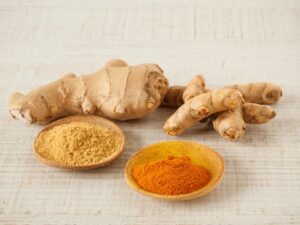
Some plants are said to have anti-inflammatory properties and turmeric is one of them. It is a spice that contains curcumin, which can reduce inflammation. This effect can also be released in the intestines. To consume turmeric, you can simply make yourself a golden milk or add it to other warm drinks. If you like ginger and have often relied on its beneficial effects, you will be pleased with our first tip. Ginger can be very soothing for the stomach and help with nausea. Simply make yourself a ginger tea or fresh ginger in warm water and feel its anti-inflammatory effect. Another tip is to consume foods rich in omega-3 fatty acids, as these can also have anti-inflammatory properties. These include flax seeds, chia seeds and walnuts, for example.
That the composition of the gut microbiome plays an important role in Crohn's disease? Studies have shown that people with Crohn's disease often have an altered intestinal flora compared to healthy people.
These medicinal plants can support you with your Crohn's disease symptoms
Real chamomile is known for its anti-inflammatory properties and is often used in a variety of ways due to its germicidal and anti-inflammatory properties. Chamomile is effective both externally for skin irritations and internally for irritations of the stomach lining. Chamomile can also have a positive effect on diarrhea or bladder irritation. The antimicrobial nature of chamomile makes it possible to kill pathogens, while rinses with chamomile extracts soothe inflamed tissue.
Natrium sulfuricum is liver cleansing and draining. It supports your body in its detoxification process by increasing the production of bile and promoting the flow of this fluid into the intestines. As a result, more harmful substances are excreted via the intestines. In addition, sodium sulphuricum binds harmful substances and cleanses the connective tissue. This reduces the amount of tissue fluid and water retention in the body.
Dandelion helps to revive a sluggish metabolism and boosts the immune system. By activating and supporting various organs, it boosts the metabolism, releases toxins and cleanses the blood. Dandelion can therefore also support weight loss.
Two important effects of Natrium phosphoricum relate to the relief of the metabolism and the regulation of the pH value. By regulating the body's environment, it supports the metabolism. This is because it promotes the elimination of waste products, which reduces the burden on the liver and kidneys. In addition, sodium phosphoricum has a pH-regulating effect by binding acidic molecules and increasing the pH value. This helps to reduce the inflammatory process and reduces the body's tendency to inflammatory reactions.
Stomach cramps can have various causes. One of them may be that there are too few digestive juices available and the intestines cannot pass the food properly. As a result, the food remains longer in the stomach, which begins to cramp. As digestion is slowed down by Masterwort is stimulated, the intestinal passage is shortened and thus also the time that the food remains in the stomach. The stomach can relax again and the cramping can stop.
In general Cardiospermum is often used for non-infectious inflammations. Its anti-inflammatory effect is used to achieve relief and alleviation for the patient. It is usually a component of mixtures that have a similar effect. This cortisone-like effect makes it very popular for the treatment of rheumatic diseases and skin inflammations.
Zimply Natural - Your natural help for gastritis
With Zimply Natural, we are the antidote to painkillers, sleeping pills, and standard medications. We are your medicine! For our mixtures we use the centuries-old natural healing method of spagyric back. The Spagyric combines the herbal active ingredients and phytotherapeutic elements of the HealingplantsThe mineral salt qualities, as well as the subtle information of the medicinal plants and the energetic potential of the Bach flowers.
With natural methods, such as the individual spagyric mixtures from Zimply Natural, your complaints can be relieved naturally and sustainably.
FAQ: Questions and answers about Crohn's disease
Is there a cure for Crohn's disease?
No, unfortunately there is currently no cure for Crohn's disease. It is a chronic disease that will be with you for the rest of your life. The intestinal disease usually occurs in episodes, in which periods with little or no effects alternate with severe symptoms. However, you should not lose hope now, because although Crohn's disease cannot be cured, it can be treated well.
Can Crohn's disease be controlled by diet?
Unfortunately, it is not possible to say exactly. This is because controlling Crohn's disease through diet works better for some sufferers and worse for others. There is no universal diet that is suitable for all sufferers. This means that dietary adjustments may or may not help you. You simply have to try it out and it is best to discuss it with your doctor. In general, however, it can be said that there are certainly some foods that are likely to irritate your stomach. Logically, you should stay away from these.
Are people with Crohn's disease at increased risk of cancer?
Compared to the general population, people who suffer from Crohn's disease actually have a higher risk of developing cancer. However, this risk is only slightly increased, so don't panic! Some of the cancers for which there is an increased risk include bowel cancer, anal cancer, small bowel cancer and certain types of lymphoma. To reduce the risk of developing the disease, it is very important that you attend regular screening and monitoring appointments.



